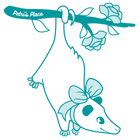As a wildlife rehabilitator at Petri's Place, I've witnessed firsthand the unintended consequences of using glue traps and poisons in efforts to control pest populations.
One of these tragic events was even featured in our documentary series Friends Of The Wild on YouTube.
While these methods may seem like quick fixes to unwanted guests, they often cause more harm than good, impacting not just the targeted pests but also a wide range of wildlife and even household pets.
In this article, I want to share the harsh realities of these methods and offer humane alternatives that are kinder to animals and the environment.
The Truth About Glue Traps
Glue traps, often marketed as a non-toxic solution to pest control, are one of the most inhumane methods available.
Animals lured onto these sticky surfaces become trapped and are unable to escape, leading to a slow, painful death from starvation, dehydration, and exhaustion.
The suffering these creatures endure can last for days.
They are fully awake and aware, often injuring themselves in desperate attempts to get free. It's not just rodents that fall victim to these traps; small birds, snakes, insects, and even young wildlife can become unintended casualties.
The Chain of Events from Poisoning
Poison bait, another common method used to control rodent populations, creates a dangerous cycle of secondary poisoning that can devastate local wildlife ecosystems.
When a rodent ingests poison, it doesn't die immediately but becomes a moving target for predators. Although a lot of pesticides are formulated to not harm domestic cats and dogs they do cause death to other animals. Owls, hawks, opossums, skunks, and other wildlife that consume these poisoned rodents can also be poisoned.
Almost every scenario ends in suffering and death.
This chain reaction can lead to significant declines in predator populations, disrupting local ecosystems and leading to an increase in the very pest populations these poisons aim to control.

The Ripple Effect of Secondary Poisoning
The effects of secondary poisoning are far-reaching. Not only does it pose a direct threat to wildlife and pets, but it can also affect humans. The use of poisons in pest control contributes to a cycle of death that is antithetical to maintaining biodiversity and ecological balance.
Basically, as we kill off wildlife with the poisons used to treat rodents, we are unintentionally INCREASING the rodent population because their predators are dying too.
Humane Alternatives to Pest Control
Understanding the gravity of the situation, it's crucial to explore humane, effective methods of pest control that don't rely on glue traps or poisons. Here are some steps homeowners can take:
- Prevention is Key: The best way to control pests is to prevent them from entering your home. Seal up cracks and openings, keep food in airtight containers, and manage waste and compost properly.
- Put Away Food: If you feed feral cats, do so in the morning and put away the food at night. Feral cat colonies will adjust their feeding schedule to accommodate the change and the rodents will no longer have a food source.
- Use Live Traps: If pests have already made their way inside, consider using live traps that capture animals without harming them. These can then be released outside, away from your home.
- Natural Deterrents: Explore natural deterrents and repellents for pests. Peppermint oil, for example, is a natural mouse repellent. Similarly, maintaining a clean and tidy garden can discourage rodents from settling in.
- Professional Help: For persistent problems, contact a professional pest control service that offers humane removal options. Many companies now focus on eco-friendly and cruelty-free methods.

You Can Help
At Petri's Place, our mission is to advocate for all wildlife, ensuring their safety and wellbeing.
By choosing humane alternatives to glue traps and poisons, you contribute to a kinder, more sustainable approach to living with the natural world.
Remember, every creature plays a role in our ecosystem, and it's our responsibility to protect and preserve these relationships.
If you encounter wildlife in distress or need advice on humane pest control methods, we're here to help.
Together, we can make a difference for the creatures that share our communities.
Here's How Can You Help:
Every dollar, wish list item and volunteer hour helps.
Make A Donation: www.fundthewild.com (one time or reoccurring donations)
Purchase From Our Wish Lists:
Additional Petri's Place Support: www.petrisplace.com
Buy our merch!! - www.petrisplace.com
Buy Trash Cat Coffee: www.trashcatcoffee.com

